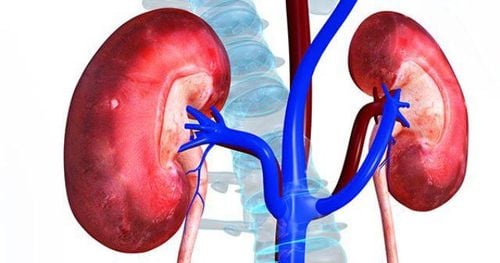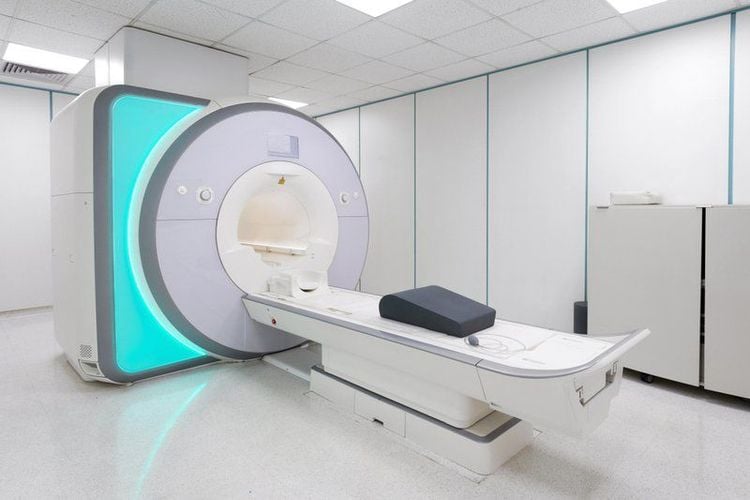This is an automatically translated article.
The article was written by MSc Vu Thi Hau - Doctor of Radiology, Department of Diagnostic Imaging and Nuclear Medicine - Vinmec Times City International HospitalThis method can evaluate the morphology, anatomy as well as pathologies related to the components of the inner ear such as the inner ear canal, cochlear canal, semicircular canals and vestibule. pathology related to inner ear malformations, vestibular and cochlear neuropathy, diseases related to inner ear endolymph.
For cases of congenital or acquired deafness with indications for cochlear implantation, MRI before insertion is necessary.
1. Indications and contraindications for inner ear MRI
1.1. Indications Congenital or acquired deafness in children as well as adults Tinnitus accompanied by dizziness Tumor-induced ear damage Other conditions suggestive of inner ear damage, diseases related to the nerves

1.2. Contraindications Inner ear MRI has the same contraindications as general MRI, as follows:
Have a pacemaker. The patient carries a potentially dangerous magnetic object when entering the magnetic field such as surgical forceps, artificial heart valve, cochlear electrode, shrapnel in the danger zone (eye socket,...). Patients carrying magnetic objects in the survey area: intramedullary nails, metal screw braces, artificial hip joints,... Severe patients need a resuscitation machine by their side. Relative contraindications:
Pregnant women under 3 months need to consider before taking the picture. Agitated patients, incubated syndromes, children ... For agitated cases, uncooperative children or adults with intussusception syndrome can be combined with anesthesia or sedation before imaging. benefit from.
Contraindications related to magnetic resonance imaging with contrast injection ::
Patients with a history of allergy to contrast agents. Patients with renal failure.

2. What should the patient prepare before taking an inner ear MRI?
If contrast injection is required, the patient should fast for at least 4 hours before the scan. Prepare full medical records, order paper to take MRI of the inner ear. Exploiting some basic clinical information related to medical examination and treatment. Psychological preparation before implementing the method should not be too worried to affect psychology. During the shooting process, you need to stay still so that the captured image does not cause noise. Remove metal objects that affect the photograph such as hairpins, earrings, necklaces.
3. Magnetic resonance imaging machine for the inner ear
The ear is an important part of the body, receiving sounds from the outside environment so that the brain and the vocal organs give accurate answers to those sounds. However, the ear is also a very small part, inside are components with a structure of less than 1mm to a few mm, so for a good evaluation it is necessary to have modern cameras, thin slices and good resolution on the surface. Picture. Currently, on the market, there are two types of MRI machines with popular magnetic force, 1.5 Tesla and 3 Tesla, with outstanding advantages compared to older machines.

For the inner ear, it is best to shoot with a 3 Tesla magnetic resonance imaging machine for good resolution images and evaluation of small structures. To examine the small nerves such as the cochlear and vestibular nerves, thin slices are needed, performed in a 3-Tesla scanner. In some cases, 3 Tesla magnetic resonance imaging is required to evaluate structures below 1mm, such as evaluating parts of the vestibule in Meniere's disease.
4. Steps to conduct an inner ear MRI
First, the patient is explained the imaging process, there is no need to fast if the scan does not inject contrast.
If there is contrast injection, the patient needs to have a kidney function test before the scan, the test can be done at another medical facility or done quickly before the scan at the hospital.
The patient is educated on magnetic resonance safety and dressed before the scan.
Entering the imaging room, the patient lies on his back, uses a cranial coil, listens to music or earplugs during the scan.
The shooting process takes about 20 minutes. The time will be increased if contrast is injected.
Assess the image and read the results of the radiologist.
In case the client cannot lie still or has closed room syndrome, anesthesiologists and neurologists will first examine and perform sedation, and evaluate anesthesia before imaging.

5. Why should I have an inner ear MRI at Vinmec?
Vinmec International General Hospital owns the most modern equipment system for diagnosis and treatment in Vietnam today. The machine systems used in the imaging department are all imported from abroad, the quality is equivalent to that of leading hospitals in developed countries such as the UK, USA, Japan,...The imaging process of Customers will be shortened but the image quality gives the best. Not only that, when performing an inner ear MRI at Vinmec, you will be examined by a team of experienced and highly qualified medical doctors.
During its operation, Vinmec always promotes the training, scientific research and skill improvement of young doctors. In addition, the medical system at Vinmec is managed and operated according to international standards, with a civilized and polite medical examination and treatment space, ensuring maximum sterilization. Vinmec is committed to bringing the best medical examination and treatment services to customers.
Please dial HOTLINE for more information or register for an appointment HERE. Download MyVinmec app to make appointments faster and to manage your bookings easily.














